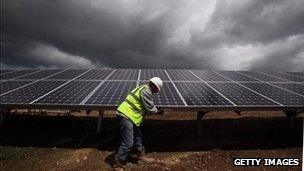Solar tariff cuts risk jobs, industry warns
- Published

The solar industry faces difficult times ahead
The subsidy for solar power is to be cut in half for new installations from 12 December of this year, the government has said.
Solar panel makers and installers say the cut will cost thousands of jobs.
It also means consumers who register for the scheme after that date - even if they have already paid a deposit - will see their return halved.
The government has launched a fast-track consultation on the change, but says it reflects falling panel prices.
The new tariff of 21 pence, down from the current 43p, will take effect from 1 April and be paid to anyone who installed their solar system after 12 December.
Speaking in an emergency debate at the House of Commons, Climate Change Minister Gregory Barker said the government risked running out of money by next year.
"Falling PV [photovoltaic] costs mean returns are double those originally envisaged for this scheme, this does not provide value for money, if we don't act now the entire £867m budget would be fully committed within the next few months," said Mr Barker.
The new tariff would bring the UK more in line with subsidy levels in Germany, he added.
Mr Barker also outlined plans to limit installations to homes that have already carried out energy-efficiency measures.
But the scale and timing of the cut has angered the solar industry, which says it will lead to job losses.
"I've talked to some companies who are looking at pulling the plug in weeks - it probably reduces the size of the industry by 15,000-20,000 jobs," said Ray Noble from the Renewable Energy Association (REA).
Analysts warned smaller firms may be worst hit by the sudden change.
"Many smaller operators are likely to struggle and go under. This will be a tough time for the industry, but it may be that this makes it more sustainable and competitive in the longer term," said David Guttmann, director at PricewaterhouseCoopers (PWC).
The opposition Labour party claimed the cut would hinder economic growth.
"With growth flatlining everywhere else, today's announcement threatens to strangle at birth the solar industry," said shadow energy and climate change minister Caroline Flint.
Rapid growth
The subsidy pays households to generate electricity from solar power at 43p per kilowatt hour, around four times what consumers pay for their electricity.
As a result, figures from Ofgem show the amount of solar power installed in the UK has increased dramatically, from 30 megawatts (MW) before the subsidy started in 2010 to 321MW by October this year.
There have been 90,000 domestic installations under the scheme so far, and the REA claims thousands more are booked, but not yet completed.
The faster-than-expected growth has put pressure on the subsidy's finances and has already triggered one review of the tariff, which reduced subsidies for larger, non-domestic projects.
The government allocated a cap of £867m to pay for the tariff which comes from a charge on consumer bills.
A report by PWC last week argued the government would need to take drastic action.
"The government could do nothing and let it run out, or it has to increase the pot of money, or it has to do something quick and deep in terms of cuts to the tariff," Mr Guttmann said.
Job losses
But the change in the tariff comes far sooner than expected.
The industry had been expecting any reduction to take effect from April next year, not from December.
The uncertainty has already had an impact on the industry, which the REA estimates employs 25,000 people.
Empower Community, a social enterprise which aimed to provide free solar panels to 22,000 tenants of social housing, says it may now struggle to find financing.
The government says it will consult on a community tariff to support such schemes.
Many of the roughly 4,000 small to medium-sized firms set up to install panels say they will have particular difficulties.
"Undoubtedly I'll have to lay people off," said Chris Cash from Eclipse Solar in Leeds, a local firm with around 20 staff.
"I don't know what we'll do, we'd have to look at other technologies but it's going to be difficult for us; we'd have to contemplate whether we carry on."
For some larger companies, it is not the size of the cut but the timing that may cause problems.
"We'd have to stop selling orders, so what do my sales staff do between now and the end of the year?," said Kerry Burns, managing director at Solar Sense.
"We won't be able to get in stock quick enough and customers won't want the new reduced tariff."
Uncertainty
The cut is the latest in a string of changes to renewables subsidies for solar and wind projects.
Sharp is the largest manufacturer of solar panels in the UK and claims the uncertainty, rather than the level of the tariff, is making investment difficult.
"They've given an industry employing 25,000 people six weeks to totally change," says Andrew Lee, international sales manager for Sharp Solar.
"We are supposed to be delivering 3,000 household installations to councils between now and the end of March - those sorts of projects could be in jeopardy straight away."
Analysts say the frequent changes in support levels may make investors abandon the market altogether.
"Renewables policy in the UK is difficult for investors," warned Mr Guttmann, referring to frequent changes in subsidy levels for wind and solar.
"This might be one of the reasons why Germany has 155 times more wind energy than the UK and is now overtaking the UK in offshore wind," he added.
- Published31 October 2011
- Published21 October 2011